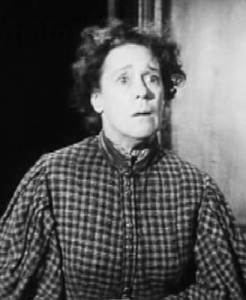To Keep Me Mouth Shut?Paying for SilenceBy
| Ad |
One of my favorite movies, and an annual viewing tradition for me, is A Christmas Carol, many versions. I don’t feel like Christmas is complete unless I’ve watched the version with Alistair Sim as Scrooge and the musical version starring Albert Finney. I like other versions as well, but I always feel like I must see these two. I first became aware of the Dickens story as a sixth-grader at Marshall Elementary School in Flagstaff, Arizona. My teacher was a Mr. Treece, who was a very tall, athletic man that I loved. He treated me very well, in contrast to life at home.
Just before Christmas, he obtained a copy of a play based on Dickens’ work and had the class do a reading of it. I remember playing Joe, the old man who buys Scrooge’s belongings from those who stole them upon his death. It was a small part and I got to read other parts here and there. It was a wonderful time for me. I loved sitting in a circle surrounding Mr. Treece and letting the story fill my head.
In the movie version aforementioned, there is a scene involving Mrs. Dilber. It is not taken from Dickens’ original work, but for me, the story isn’t complete without it. In the original, Mrs. Dilber is the laundress who stole Scrooge’s sheets and towels. In the 1951 film, she was the charwoman who stole the bed curtains and rings.
In the scene added by this film, Scrooge awakes and finds that he is still alive and that the bed curtains are still there. A knock at the door reveals Mrs. Dilber, played by the wonderful British character actress, Kathleen Harrison, carrying a tray of breakfast for the repentant miser. After some antics, Mrs. Dilber is sure the old man has gone balmy. She tries to escape but he catches her.
She warns him that if he is violent, she will have to call for the beadle (officer). He opens her hand and places a guinea in it, a coin worth ten times her weekly salary. She asks, “Here, what’s this for?”
He replies, “I’ll give you one guess.”
She asks, frightened, “To keep me mouth shut?”
[display_podcast]
Have you ever had the feeling that people are being nice to you just to placate you so you won’t make any waves? I’ve wondered that sometimes. I’m probably a real sucker for the ploy. I like people to be nice to me.
I guess I also like being nice, not making waves, and keeping things to myself. I remember many years ago, before my mother passed away, that she revealed to me something about her life I had not known before. I asked her why she hadn’t told me before. She replied, “In my family, we keep things to ourselves.”
I suppose I inherited that unfortunate legacy. I say it is unfortunate because it leads to so much trouble. It led to years of me being molested by a family member. I kept it to myself as per my abuser’s instructions.
Being nice is fine. I think it is a great virtue. I’ve never wanted to be an angry, in-your-face defender of all that I deem to be right. I don’t want to operate that way as a default. I think civility is an important thing.
However, for too many years, I thought that civility meant never bringing up anything negative. Making waves was poor manners. Keeping things to myself was good manners.
It’s strange that in my early adult years, I was a very angry man. Ask my wife and kids. It all changed the day I decided to break silence about my abuse. I felt freed from the grips of two decades of the effects of silence.
Well did the Psalmist say, “When I kept silence, my bones waxed old through my roaring all the day long (Psalms 32:3).”
Not only did I become less angry, I became more assertive. Some people think they are the same thing. They are quite different. Think of a continuum from passive through assertive to aggressive. Passive and aggressive are strange relatives. They are different sides of the same coin. I was passive (silent) with occasional outbursts of aggressive (blow-ups). What happened to me when I broke silence was that I was finally able to stand up for myself without being mean about it. It is a great balance. I highly recommend it.
Not everyone likes my new openness. It wasn’t just the assertiveness they didn’t like. It was the willingness to talk about abuse issues and about my same-sex attraction struggles, both considered by many people to be distasteful subjects better kept to oneself.
More than once, I’ve had someone tell me that I should only talk about these two things with my bishop. I ask you, what about either of these things should I discuss with my bishop? One the one hand, being the victim of childhood sexual abuse is not something that requires confession. An abused child hasn’t done anything wrong.
As for the same-sex attraction, I took whatever behavior I had indulged in to a bishop a long, long time ago, decades. As many times as I’ve been assured by general conference talks that merely experiencing same-sex attraction itself is not a sin, the attitude still lingers heavily in the Church that it is.
Now, I don’t completely discount taking these matters to a bishop for the sake of receiving support. I first took my abuse to a bishop about fifteen years ago. I was worried I was in danger of acting out my abuse with sexual contact with other men. I make a distinction between same-sex attraction and sexual behavior involving men, as did Elder Dallin H. Oaks in his 1995 Ensign article on the subject.
Even though I was not there to confess any serious sins, I needed help dealing with my childhood abuse. He appropriately referred me to a qualified therapist who helped me a great deal in dealing with those issues. I was glad I asked my bishop for help.
The problem with the advice to go to a bishop is when someone urges it thinking that only a bishop should be consulted and the person shouldn’t seek support from friends and family. That anger I spoke of never came out any stronger than when someone suggested that my abused status was something I should confess to a bishop. It hints that a child is at fault for being abused.
Believe me, I already struggled with that thought. One way an abuser keeps his victims silent is to convince them that it is their fault and that they’ll get in just as much trouble as the abuser. It was true in my case.
It is equally obnoxious to me to suggest that my struggle with same-sex attraction is something I should keep to myself and only discuss with my bishop. I would probably agree if I was doing something that I needed to confess to him. I always want my bishop to know the fact that I struggle, but I reserve the right to talk about to it to whomever I please.
I used to be very vocal about it. What you can find on this blog and those at LDSR.org and rexgoode.com are things I’ve written over a period of about seventeen years. They’ve been on the internet since back before the weblog (blog) was invented. I’ve been “out” a long time.
When I moved to Ohio in late 1995, some of my writings preceded me in the form of someone forwarding them to my new stake presidency before I even had an address. Of course, what was sent was carefully chosen to make it look like I was some kind of predator moving in to snatch up unsuspecting men who would fall prey to my wicked advances. A member of the stake presidency confronted me within a very short time after my family moved with me.
The result of that confrontation and my standing up for myself, as well as my wife’s ever-stalwart defense of me, was that I was allowed to speak about it in firesides and with other stakes in the region.
That same member of the stake presidency who first confronted me moved to New York state and became a stake president there. On a visit back to Ohio a couple of years later, he pulled me aside in the hall. He said that he was working with a man in his stake who struggled with same-sex attraction. The man came to see him with a large stack of paper. The man said, “Read this and you will understand me.”
The stack of paper was a printout of essays written by me and posted on the internet. The stake president said, “I just wanted to thank you. I’ve learned so much from you.”
When my mother was diagnosed with Pancreatic Cancer in 1999, I moved back to Oregon. Things were different there. It felt like local leaders didn’t want me to talk about it at all. I started a local support group, meeting in my home. Eventually, LDS Family Services agreed to take it on as a sponsor. I was retained as the group facilitator and began working with some Church Service Missionaries who became my good friends.
I was told on more than on occasion that LDS Family Services preferred that I keep a low profile. After ten years, LDS Family Services was told they could no longer operate a same-sex attraction support group and our group disbanded. We’ve taken it back to private operation. It is small, but still doing good.
These events and others over a matter of years has led me to wonder if I’m not being paid a guinea, so to speak, to “keep me mouth shut.” I don’t feel any lack of respect from my leaders. I think they do respect me. A very few have even ventured to say so.
I don’t mean to accuse them of being insincere, but I also get this niggling feeling that there is a subtext of hoping that I don’t speak too loudly about same-sex attraction and sexual abuse recovery issues. I wonder, if I’m right, what they think the result would be if I stood up and said that it is possible, as a man who deals with same-sex attraction, to be happy being faithful to the teachings of the Church and being faithful to covenants. What would be the outcome if I said that the gospel offers hope and healing to those who have been abused? How could it hurt if I said that there are children among us even now who are being abused and we need to let them know that they can tell? Would it be so wrong to hope that leaders and teachers are trained in how to deal with it when they become aware of a child being abused?
I am frustrated at the silence. Recently, I heard of the suicide of a man I had only met once. He grew up in the Church but left it when he couldn’t reconcile his homosexuality with the teachings of the Church. Now, I’m the last one to blame any person’s choice to take his own life on any individual or institution. Depression and suicide are complex issues that can’t be explained by finding someone or something to blame.
At the same time, silence about same-sex attraction leaves those who struggle with it wondering where they fit. Despite everything I’ve written over the years, I still wonder that myself. I don’t deal with depression, but for someone who does, it can’t help to have to wonder who you are and how you fit in a Church that says that the things you feel like doing are wrong.
I’m not saying that the Church needs to change their standards or definition of morality. It goes back to that assertive thing about not keeping silent. The history of the Church’s dealing with homosexuality seems to swing back and forth between passive and aggressive.
Remember when my mother said to me that, in our family, we keep things to ourselves. What she was talking about was answering my question about why she never told me anything about my biological father, where he was and why he left us. When I was a boy, gripped by abuse, I reasoned that my father was lost at sea and as soon as he was found, he’d come and rescue me.
You see, when you are passive, keeping your mouth shut about important things, children need an answer. If you won’t give it to them, they’ll make something up. They have to assign meaning to things.
The Church’s children need that as well. No matter how old we get, we still retain that need to put a meaning to things that don’t make sense to us. If we get silence, we have to make something up. The consequences of people having to make things up are devastating when we’re talking about the gospel of Jesus Christ.
We need more openness about same-sex attraction. People are dying, physically and spiritually. The question posed by the Apostle Paul regarding the speaking and interpretation of tongues is applicable. “For if the trumpet give an uncertain sound, who shall prepare himself to the battle (1 Cor. 14:8)?”









I have tried to be open. Years after I came out in one of my wards, one of the members finally came up to me to tell me he had SSA. Little did I know that he was watching everything I did after I came out. I did not realize how much of an example I had been to him.
Thanks for the story. It is by speaking out that we can help those who suffer in silence.
Amen
Thanks, Joshua and Ross. I appreciate the comments and the reading. This post got a lot of reads, but very few comments. I guess I left almost everyone speechless. 🙂
Rex,
Well-stated as always. I, too, wonder sometimes what the supposed gain is from simply not talking about same-sex attraction in the Church, especially in terms of people’s personal experiences. Do people think it will reduce the likelihood of other people experiencing such attractions?
I think a lot of it is that people are uncomfortable with such topics and don’t feel they know how to react to them. It troubles the peace they expect and want to find in Church settings, and so they decide it must be somehow inappropriate. Sometimes, though, Church isn’t there to make us comfortable, but rather to make us better people (not a comfortable process!) — and provide opportunities for us to serve other people (also often not a comfortable process).
I run into the same thing in Mormon literature. Far too many LDS readers believe that the purpose of literature, particularly literature written by and for Mormons, is to give them an untroubled break from everyday life. That’s certainly *one* legitimate purpose for literature. My problem comes when people (again) try to draw a boundary around the whole of Mormon literature and say that a subject is somehow “inappropriate” if people find it troubling.
Compliments can be the flip side of this attitude. “I respect you” may not be code for “please shut up,” but I think there’s often an unspoken discomfort that lurks behind it: “I respect you, because I could never talk so openly about something like this. Just listening to you makes me uncomfortable.”
Best hopes for a good new year.
Thanks, Jonathan. Amen to all you said. Like church, I’m not here to make people comfortable either. 🙂
[…] have written of these verses before. Before I owned up to my experience with same-sex attraction and began to be open about it, I was […]